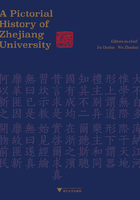
Chapter II A National University for Noble Ambition (1928-1937)

Chu Kochen thought, “Professors, equipment like instruments and books, and buildings are the most important elements in university education, among which sufficient professors are of the greatest importance.
Professors sustain a university and decide the academic style of a university.”
National Zhejiang University in its early stage from 1928 to 1936 was not only a continuation of Qiushi Academy and Zhejiang Advanced Academy in system. More importantly, it inherited and developed the tradition of “seeking truth”. In this period, the university achieved an initial success in teaching, research and experiments with a fledgling framework of modern university education and better conditions.
The National Third Sun Yat-sen University changed its name into Zhejiang University in February 1928, into National Zhejiang University in May the same year. Jiang Menglin, Shao Peizi, Cheng Tianfang, Guo Renyuan, and Chu Kochen were appointed to be the president successively.
National Zhejiang University emphasized teaching and research galvanizing each other and a fusion of cultivating talents and serving the society. The College of Liberal Arts and Sciences, focusing on the education for intellectuals, was committed to academic research, encouraging teachers to impart scientific knowledge, nurturing students with the ethos of faithfulness, honesty, hardworking and astuteness, and cultivating talents among knowledgeable intellectuals to serve society. The College of Engineering and the College of Agriculture continued the good tradition of equal emphasis on knowledge and practical skills, and prioritized experiments as well as teaching practice in workshops, farms and forest farms, and initiated Xianghu Farm and Commercial Forest Farm for a better combination of teaching, research and practice. The College of Agriculture also wrote to provincial governments across China to collect superior crop strains, which not only facilitated teaching and research activities in the university, but contributed to modern agricultural science in China and the popularization of excellent strains.
In this period, the university was enlarged with an improved array of programs and departments in line with social demands and the instructions of the Ministry of Education and Zhejiang Provincial government. By 1937, there were 4 departments in the College of Engineering, namely, Electrical Engineering, Chemical Engineering, Civil Engineering, and Mechanical Engineering, 5 departments in the College of Agriculture, namely, Agronomy, Horticulture, Plant Protection, Sericulture, and Agricultural Economics, and 7 departments in the College of Liberal Arts and Sciences, namely, Foreign Languages, Education, History and Geography, Mathematics, Physics, Chemistry and Biology. Meanwhile, the university was also commissioned with secondary vocational schools, i.e. Zhejiang Provincial Hangzhou Advanced Engineering Vocational School and Zhejiang Provincial Hangzhou Advanced Agriculture Vocational School.
In December 1935, a student strike against President Guo Renyuan was launched to force the Chinese National Government to replace Guo Renyuan with Chu Kochen, a famous scholar and meteorologist with great popularity. Based on the previous experience of studying at Harvard University where he was immersed in modern university education, Chu developed a unique insight and vision on how to operate an excellent university. He thought, “Professors, equipment like instruments and books, and buildings are the most important elements in university education, among which sufficient professors are of the greatest importance.”Since then, emphasizing “professors as priority”, President Chu pushed reforms in democratic management and improvement of education conditions, securing the trust and appreciation of both students and teachers.
National Zhejiang University in its early stage from 1928 to 1936 was not only a continuation of Qiushi Academy and Zhejiang Advanced Academy. More importantly, it inherited and developed the tradition of “seeking truth”. In this period, the University achieved an initial success in teaching, research and experiments with a fledgling framework of modern university education and better conditions. Chu's appointment was an essential turning point in the history of Zhejiang University as his advanced education vision and values, resilience, stamina and charisma to the university played a crucial role in its rise during the westward migration and the development of the University in the long run.
List of Presidents of Zhejiang University (1928-1937)
